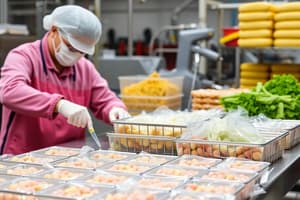Podcast
Questions and Answers
What is one key component of Good Manufacturing Practices (GMP)?
What is one key component of Good Manufacturing Practices (GMP)?
- Avoiding standard operating procedures.
- Ensuring product quality and purity. (correct)
- Limiting equipment maintenance to only when broken.
- Maximizing production speed above all else.
Which of the following is a requirement for equipment maintenance in food manufacturing?
Which of the following is a requirement for equipment maintenance in food manufacturing?
- All maintenance can be deferred for cost efficiency.
- Equipment cleaning is optional if production is high.
- Equipment should only be cleaned when visibly dirty.
- Regular maintenance checks to prevent contamination. (correct)
What does personnel training in GMP focus on?
What does personnel training in GMP focus on?
- Understanding hygiene and food safety procedures. (correct)
- Training employees for maximum production.
- Ignoring allergic ingredient handling requirements.
- Minimizing time spent on food handling.
Why is sample integrity important in Good Laboratory Practices (GLP)?
Why is sample integrity important in Good Laboratory Practices (GLP)?
What aspect of GLP involves ensuring equipment is working accurately?
What aspect of GLP involves ensuring equipment is working accurately?
What is an essential practice for personal hygiene in food handling?
What is an essential practice for personal hygiene in food handling?
What is a critical component of a clean facility in GMP?
What is a critical component of a clean facility in GMP?
How should documentation be handled in GLP?
How should documentation be handled in GLP?
What is the primary goal of facility design in food safety?
What is the primary goal of facility design in food safety?
Which practice is essential for ensuring the reliability of laboratory results?
Which practice is essential for ensuring the reliability of laboratory results?
What aspect of employee training is vital for maintaining food safety standards?
What aspect of employee training is vital for maintaining food safety standards?
Why is accurate documentation crucial in food production?
Why is accurate documentation crucial in food production?
Which personal hygiene practice is critical for preventing food contamination?
Which personal hygiene practice is critical for preventing food contamination?
What should employees report to maintain food safety?
What should employees report to maintain food safety?
What is a key element in good laboratory practices regarding sample integrity?
What is a key element in good laboratory practices regarding sample integrity?
What is the role of protective clothing in food safety?
What is the role of protective clothing in food safety?
What behavior should be avoided to prevent food contamination in handling areas?
What behavior should be avoided to prevent food contamination in handling areas?
Which practice is essential for preventing cross-contamination in restaurant kitchens?
Which practice is essential for preventing cross-contamination in restaurant kitchens?
What is a good practice in temperature control for food safety?
What is a good practice in temperature control for food safety?
What method can help prevent cross-contamination during food handling?
What method can help prevent cross-contamination during food handling?
Which of the following is a principle of legal metrology?
Which of the following is a principle of legal metrology?
What should be done to ensure measurement accuracy in trade?
What should be done to ensure measurement accuracy in trade?
In terms of consumer protection, why is transparency important?
In terms of consumer protection, why is transparency important?
Which action is vital for maintaining consumer trust in food products?
Which action is vital for maintaining consumer trust in food products?
What is the primary purpose of health screenings for employees in food handling?
What is the primary purpose of health screenings for employees in food handling?
Which of the following is an example of temperature control in food handling?
Which of the following is an example of temperature control in food handling?
What practice helps prevent cross-contamination in kitchens?
What practice helps prevent cross-contamination in kitchens?
What is a key focus of Good Handling Practices (GHP)?
What is a key focus of Good Handling Practices (GHP)?
What does legal metrology require regarding food product labeling?
What does legal metrology require regarding food product labeling?
What is a benefit of implementing good manufacturing practices (GMP)?
What is a benefit of implementing good manufacturing practices (GMP)?
Which of the following is NOT considered a good pest control measure?
Which of the following is NOT considered a good pest control measure?
Why is calibration of measurement devices important in food production?
Why is calibration of measurement devices important in food production?
Flashcards are hidden until you start studying
Study Notes
Good Manufacturing Practices (GMP)
- GMP provides guidelines for processes, procedures, and documentation to ensure product quality and purity.
- Standard Operating Procedures (SOPs) are essential for controlling critical processes, e.g., precise cooking and canning temperatures for canned foods.
- Equipment must be regularly maintained and cleaned to avoid contamination, such as checking dairy pasteurizers.
- Personnel training is crucial for hygiene and food safety, ensuring workers can safely handle ingredients.
- Facility cleanliness is vital; for example, meat processing plants must have effective sanitation schedules to prevent pathogen spread.
Good Laboratory Practices (GLP)
- GLP sets principles for laboratories testing and calibrating food samples to prevent contamination.
- Proper sample integrity includes correct collection, storage, and handling, especially for pesticide residue testing.
- Regular calibration and validation of equipment, like spectrometers in food chemistry labs, ensure accurate analysis results.
- Documentation of procedures, results, and corrective actions is necessary, such as recording incubation data in microbiology labs.
Personal Hygiene
- Personal hygiene is vital in preventing food contamination in production areas.
- Regular handwashing before and after handling food is required; for example, sandwich shop employees must wash hands between raw meats and ready-to-eat foods.
- Protective clothing, including gloves and hairnets, helps minimize contamination risks.
- Health screenings for employees, particularly in seafood processing, prevent potential contamination from illnesses.
Good Handling Practices (GHP)
- GHP focuses on safe food handling, storage, and transportation to avoid contamination and foodborne illnesses.
- Temperature control, such as using refrigerated trucks for fresh produce, is crucial for maintaining food safety.
- Preventing cross-contamination involves strict segregation of raw and cooked foods, with dedicated tools like cutting boards.
- Pest control measures in food storage areas, such as grain silos, help protect food from infestations.
Legal Metrology
- Legal metrology ensures measurement accuracy in commercial practices, impacting consumer trust and fair trade.
- Food product labels must accurately reflect contents, such as verifying the weight of packaged snacks.
- Measurement devices used in production, like deli scales, require regular calibration to maintain accuracy.
- Transparency in product information, including quantity and nutritional content, is essential for consumer protection.
GMP Principles
- Quality control ensures batch compliance with standards and effective documentation of production processes.
- Facility design and maintenance should prevent product cross-contamination during processing.
- Employee training on updated food safety protocols is key for maintaining hygiene practices.
GLP Principles
- Sample integrity prioritizes contamination prevention through proper collection and storage methods.
- SOPs provide a framework for laboratory activities, ensuring consistent and reliable results.
- Data management practices, including secure storage, support data integrity and accurate reporting of results.
Personal Hygiene Principles
- Hand hygiene through frequent washing reduces pathogen transfer risks in food preparation areas.
- Health reporting requires employees to disclose any health issues that might compromise food safety.
- Personal behaviors must be monitored to avoid actions that could contaminate food, like eating in food handling areas.
GHP Principles
- Handling practices should reduce product damage while preventing contamination during food preparation.
- Regular cleaning and sanitation of food contact surfaces and equipment are necessary for maintaining safety standards.
Legal Metrology Principles
- Accurate measurements must meet national or international standards and be transparent to consumers.
- Compliance with legal measurement standards ensures fairness and protects consumer interests.
Applications by Sector
- Dairy Industry: Involves proper pasteurization of milk and thorough documentation for compliance.
- Bakery: Requires strict cleaning protocols to avoid buildup of potentially harmful old dough.
- Food Chemistry Analysis: Conducts nutritional content checks to confirm regulatory compliance.
- Microbial Testing: Assures food safety by testing for pathogens, particularly in meat products.
Studying That Suits You
Use AI to generate personalized quizzes and flashcards to suit your learning preferences.




